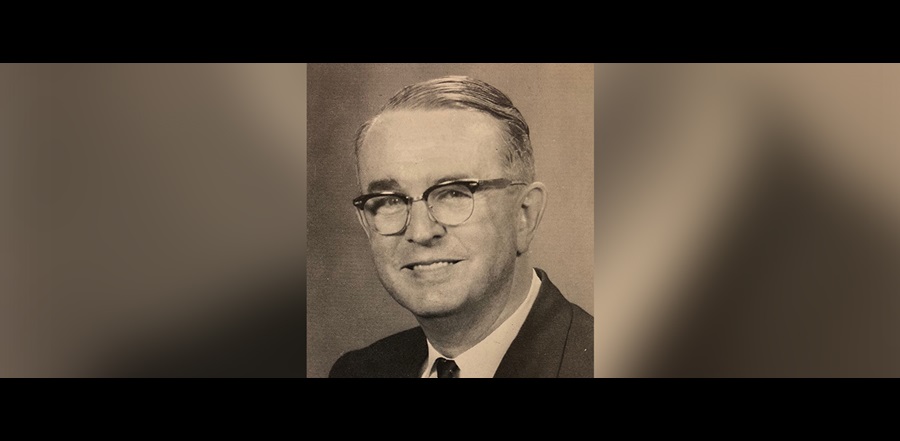Briggs Dingman: How an Evangelical Minister Overcame Prejudice Against Pentecostals
This Week in AG History — January 24, 1948 By Darrin J. RodgersOriginally published on AG-News, 27 January 2022 Briggs P. Dingman (1900-1968) was a renaissance man — he served as a minister, musician, author, linguist, and educator. He spent … Continue reading

This Week in AG History — January 24, 1948
By Darrin J. Rodgers
Originally published on AG-News, 27 January 2022
Briggs P. Dingman (1900-1968) was a renaissance man — he served as a minister, musician, author, linguist, and educator. He spent the first half of his ministry in Methodist, Presbyterian, and Baptist churches and as an officer in the Salvation Army. Much to his own surprise, however, he spent the latter half of his ministry in Pentecostal churches and schools.
Dingman, who shared his testimony in the Jan. 24, 1948, issue of the Pentecostal Evangel, had a broadly informed worldview. He attended Dickinson College, Moody Bible Institute, and Xenia Theological Seminary (a Presbyterian school). He was studious, had a working knowledge of at least five languages, and authored a novel, By Ways Appointed (Moody Press, 1935). Dingman considered himself to be “open-minded” on theological matters. Yet early in his ministry he reflexively rejected Pentecostal claims without first examining them.
It is easy to dismiss people and beliefs, Dingman came to realize, based on a caricature. He had little actual experience with Pentecostals. He had encountered some Pentecostals whom he deemed to be “ultrademonstrative,” and he had read that others handled snakes. He assumed Pentecostals to be deluded or even demon-possessed.
Dingman’s views of Pentecostals began to change when he came into contact with a young Assemblies of God minister. They became friends, and Dingman grew to admire his spiritual life. He felt “forced to admit” that the Assemblies of God preacher and his wife had a closer walk with the Lord than he did.
When Dingman took a different pastorate, he became friends with another Pentecostal minister who was overflowing with joy and spiritual depth. Dingman began developing an internal conflict when it came to Pentecostals — he admired their spirituality but pitied them for believing a “delusion.”
An Assemblies of God pastor who befriended Dingman wisely appealed to Dingman’s desire to be open-minded. He encouraged Dingman to read Assemblies of God literature and to judge for himself whether Pentecostal beliefs were biblical. One of the first books he read was by Robert Chandler Dalton – a Baptist chaplain who had been baptized in the Holy Spirit and who transferred his ordination to the Assemblies of God. Dingman was stunned. Dingman had been a longtime friend of Dalton.
Dingman voraciously read book after book about Pentecostal beliefs. He came to two conclusions: 1) anti-Pentecostal books were written by people who apparently had very limited knowledge of actual Pentecostal teachings; and 2) Scripture teaches that the baptism of the Holy Spirit often follows conversion. His preconceived anti-Pentecostal prejudices shattered, Dingman determined that he would seek a deeper relationship with God, even if it meant identifying with the Pentecostals.
Shortly afterward, Dingman was baptized in the Holy Spirit. He recounted, “there was no hysterical outburst or extreme manifestation” — his soul was simply flooded by a “real visitation of the Holy Spirit.”
How would Dingman’s former ministry colleagues react? Dingman anticipated criticism: “Doubtless many of my former pastor and laymen friends feel that now I am deluded, but I feel that I may be permitted to exclaim, “Oh, sweet delusion!”
Dingman explained how the baptism in the Holy Spirit brought him into a deeper relationship with God, wondering how spiritual depth could be called a “delusion.”
He wrote: “If having a continuous spirit of praise to my heavenly Father is delusion, then may it continue! If having a walk with God that was never before so rich, is delusion, then may I grovel in this ignorance until He comes! If having His daily blessings poured out upon my life in measure never before so copious is delusion, then this experience is an anomaly if there ever was one. No, far from suffering from a delusion, I have found the light, and what a light it is!”
Dingman cast his lot with the Pentecostals and never looked back. He transferred his ordination to the Assemblies of God in 1945. He went on to serve as a professor at two Assemblies of God schools: Northeastern Bible Institute (Framingham, Massachusetts) and Southwestern Bible Institute (now Southwestern Assemblies of God University, Waxahachie, Texas). He also taught at Elim Bible Institute (Lima, New York).
Briggs Dingman’s testimony illustrates the prejudice that often existed against early Pentecostals. Despite this prejudice, however, the Pentecostal movement became one of the largest revival and renewal movements in Christian history. Countless people, including seasoned ministers like Dingman, found spiritual depth and renewal within Pentecostalism.
Read Dingman’s article, “Is Pentecost a Delusion?” on pages 3 and 7 of the Jan. 24, 1948, issue of the Pentecostal Evangel.
Also featured in this issue:
• “A Precious Friend, or an Offence – Which is Christ to You?” by Lee Krupnick
• “The Revival in Ireland in 1859”
And many more!
Click here to read this issue now.
Pentecostal Evangel archived editions courtesy of the Flower Pentecostal Heritage Center.
Do you have Pentecostal historical materials that should be preserved? Please consider depositing these materials at the Flower Pentecostal Heritage Center (FPHC). The FPHC, located in the Assemblies of God national offices, is the largest Pentecostal archive in the world. We would like to preserve and make your treasures accessible to those who write the history books.
Flower Pentecostal Heritage Center
1445 North Boonville Avenue
Springfield, Missouri 65802 USA
Phone: 417.862.1447 ext. 4400
Toll Free: 877.840.5200
Email: archives@ag.org
Website: www.iFPHC.org




